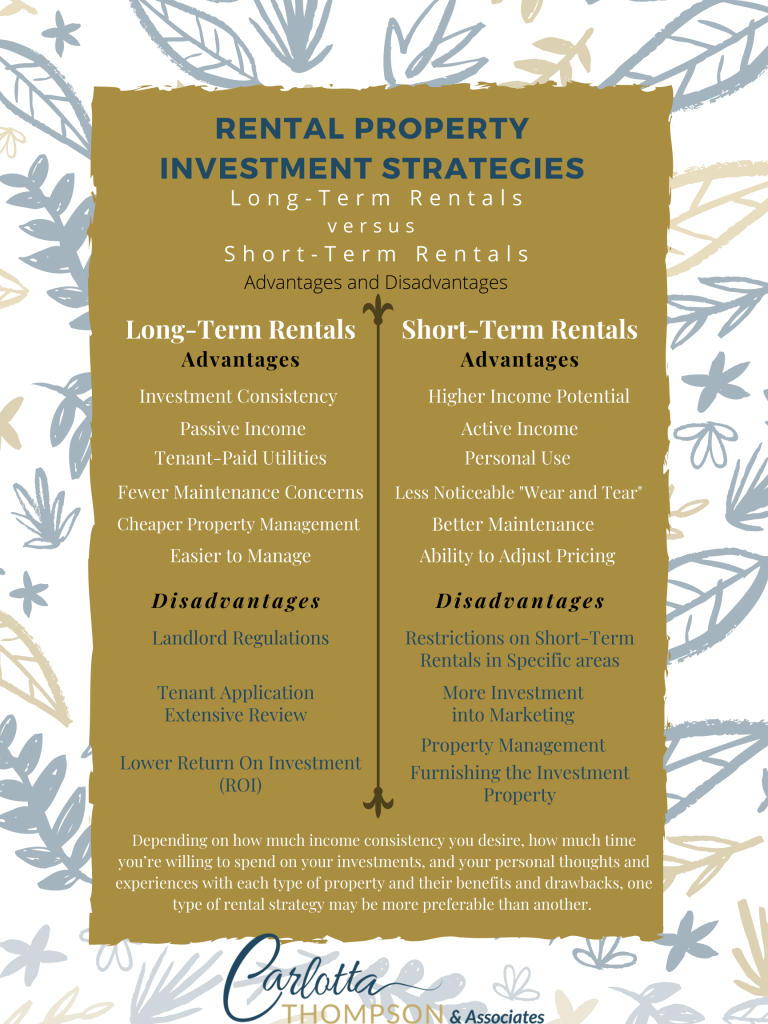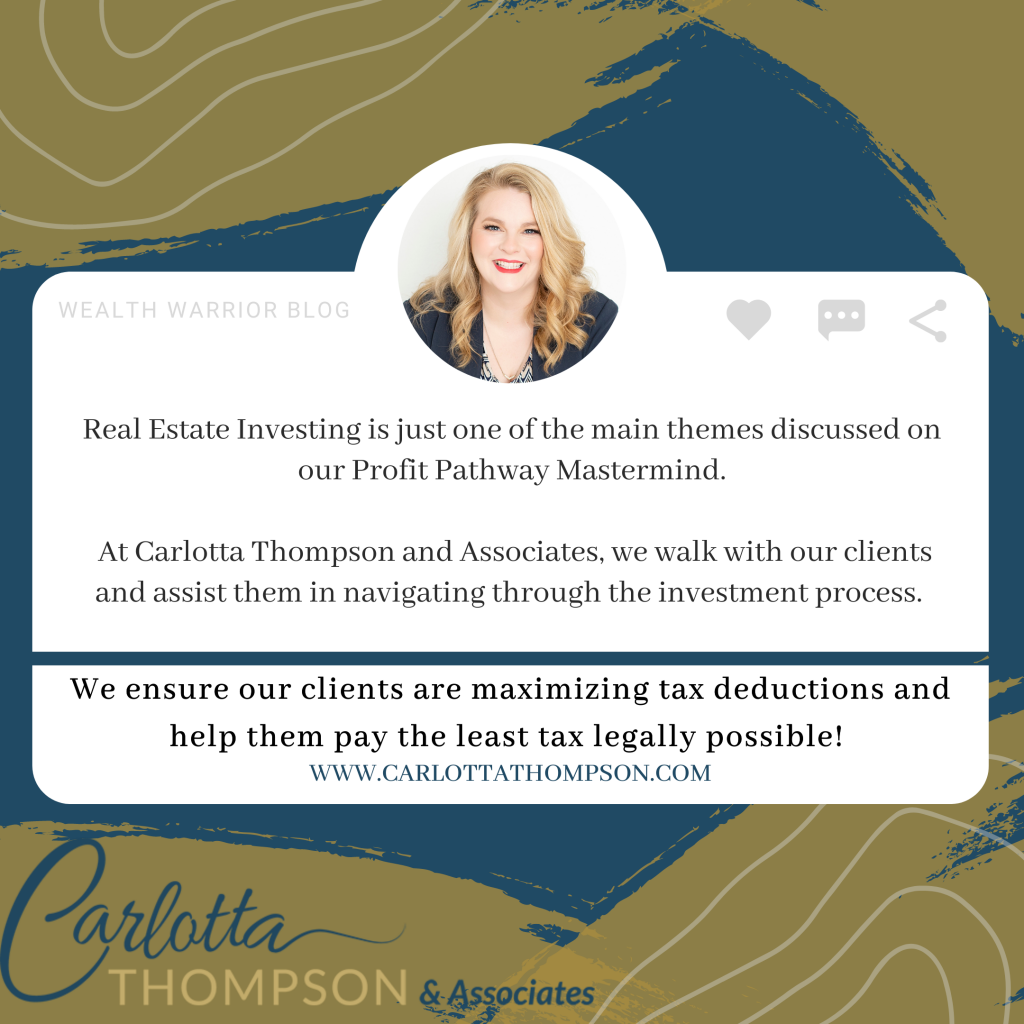Investing into Real Estate is one of the best ways to accrue passive income, produce tax free generational wealth, while also maximizing tax deductions to offset tax liabilities. Long-Term and Short-Term Rentals are both types of rental property investments, but they are two very different ways to put your money to work in real estate. Remember, money at work is not taxed the same as money sitting is. An investor should position the rental property based on which strategy would maximize cash flow in their specific market in addition to their desired personal preferences and respective time allocation.
In this article, we’ll review both types of rental investments, their advantages and disadvantages, while encompassing our proven investment strategies.
Investing Strategy: Long-Term Rentals
Long-Term rentals are a traditional investment strategy, with an annual leasing contract agreement between the owner/management company and the tenants.
Investment Consistency:
Because the property is being occupied by the same individuals over an extended period of time, long term rentals tend to produce consistent rental income. This strategy has very little concern for busy vs slow seasons.
Tenant-paid utilities:
Most leasing agreements pass the responsibility of utilities off to the tenant. Short-term renters don’t have to worry about the utilities and are typically less conscientious about conserving resources.
Fewer Maintenance Concerns:
While tenants typically don’t take care of homes the way that homeowners do, they tend to handle some of the maintenance issues. These issues include cleaning and other essential tasks, and sometimes even yard upkeep and maintenance.
Cheaper Property Management:
With less turnover and ongoing maintenance and marketing requirements, property managers are less expensive.
Easier to Manage:
Long-term rentals generally require less time in management. The owner doesn’t have to advertise the property as frequently nor handle constant tenant turnover and the associated cleaning. Additionally, the owner doesn’t have to ensure the property is available and ready to rent on a day-to-day basis.
Disadvantages in Long-Term Rentals Investments:
Landlord Regulations:
There are certain laws and regulations owners must follow when renting out a property, which should all be included in the leasing terms. These requirements include landlords giving advance notice before entering the property, even if it’s for maintenance purposes in addition to the application and eviction processes. It’s crucial to research and understand the area’s regulations to avoid any potential legalities.
Tenant Applications:
The typical lease application is one year, so it’s highly important that you find the right tenants for your property. The review process of applications should not be rushed and should focus on prior rental history. The owner or property manager should beware of red flags, such as previous evictions and disobeying rental terms and agreements.

Investing Strategy: Short Term Rentals
Short Term rentals have recently become very popular due to platforms like Airbnb and VRBO, especially in tourist hubs and vacation destinations. Thus, this type of investment property – booked by a specific individual – usually has a duration of a few days, a couple of weeks, or up to a month.
Higher Income Potential:
Especially in a popular vacation destination area, short term rental properties can make more money by charging a higher nightly rate. Though occupancy can fluctuate and management expenses are generally higher (i.e. cleaning fees), the higher income can help to offset those expenses long term. Off-season vacancies also need to be a consideration when factoring costs and should be taken into account when setting rental rates.
Investing in Personal Use:
This is the number one advantage of having short term rental properties in my opinion. Like stated above, owning rental properties is an amazing investment. You’re able to deduct depreciation of the asset while it’s actually very much appreciating, thus, offsetting your tax liabilities.
Furthermore, when you decide to visit the properties, it’s tax deductible because you’re checking on it and providing maintenance while you’re there.
Carlotta Thompson and Associates
Additionally, it’s much easier for the owner to block off the dates they want to visit with a short-term rental.
Less noticeable wear and tear and better maintenance:
These types of properties tend to be occupied during peak tourist seasons and the weekends. However, this type of investment property is less likely to be occupied throughout the week and during the slow seasons. Due to this, it typically takes longer to accumulate more noticeable wear and tear on the property. Furthermore, they are generally better maintained as the unit is typically cleaned more frequently. Due to the high turnover, it can be easier to identify maintenance issues before they become serious problems. The owner also has easier access to the property without disturbing the residents.
Active Income
Ability to adjust pricing:
Owners of the short term rental properties have the ability to adjust the rates and fees between occupants as they see fit. By increasing the rates during high demand, they owners produce more income without being held to the terms of a contract over an extended period of time.
Noteworthy Disadvantages:
Restrictions on short term rentals:
Many resort areas and some vacation destinations have county/city restrictions on short term rentals. One reason for this regulation includes maintaining an adequate supply of affordable housing for year-round residents. In addition, another reason for the restrictions are to decrease interference with established resorts, hotels, and time sharing communities.
Some places require permits or licensing to offer short term rental properties, which can become very expensive. In other places, you may need to register with the city government before renting. Additionally, some communities also have HOA restrictions. I highly suggest doing research before purchasing properties to avoid any and all penalties. Contacting a local real estate agent can be a valuable resource in helping navigate the rental rules and regulations in the area you’re looking to invest.
More Investment into Marketing:
Consider what gives your property an edge above the competitors and capitalize on it! If your property isn’t advertised well, you will not have many occupants due to the highly competitive market. Platforms like Airbnb and Vrbo help with marketing, communication between host and prospective occupants, updating property information, a streamlined booking process, and offering promotional discounts but charge service fees.
Furnishing the Investment Property and Property Management:
Most guests judge the property by the appearance and expect the short-term rental investment to be nicely furnished. This increases overhead and requires that the owners update and/or replace furnishings as needed. The owner will also be responsible for coordinating guest check-ins, cleaners, and maintenance workers and will require pre-planning if not living locally. Qualified Property Managers can assist with this responsibility, but it is an additional cost to consider.
Decisions about investing cannot be standardized as there’s no perfect answer for everyone. Depending on how much income consistency you desire, how much time you’re willing to spend on your investments, and your personal thoughts and experiences with each type of property and their benefits and drawbacks, one type of rental properties may be more preferable than another.
As showcased in the video, Real Estate Investing is just one of the main themes discussed on our Profit Pathway Mastermind. At Carlotta Thompson and Associates, we walk with our clients and assist them in navigating through the investment process. We ensure they’re maximizing tax deductions, and helping them pay the least tax legally possible. Book your free consultation with our team today!

Tax Avoidance Strategies: Business Tax Rate Lessons From A Former IRS Agent
Where Can I Get Expert Tax Advice?
What You Need To Know About Long-Term Vs Short Term Rentals – Forbes


